U.S. Society and Culture
1619 Arrival of First Africans in Bondage, in Jamestown, Virginia
1652 First Law Against Slavery in North America Enacted in Rhode Island
1671 Maryland Enacts Conversion Law
Maryland passed a law stating that the conversion of enslaved African Americans to Christianity did not affect their status as enslaved people.
1739 Stono Rebellion Organized by Carolinian Slaves
This failed revolt is the earliest known organized act of rebellion against slavery in the United States.
1775-1783 American Revolutionary War
1817 The American Colonization Society Established
The American Colonization Society transported emancipated slaves and freedmen to Africa and established a colony that became the republic of Liberia in 1847.
1818 Birth of Frederick Douglass
American abolitionist, editor, author, statesman, orator, and reformer Frederick Douglass was born. Considered one of the most prominent African Americans of his time, he died in 1895.
1821 Birth of Underground Railroad Conductor, Harriet Tubman
Harriet Tubman was an escaped slave and abolitionist who led approximately 300 slaves to freedom.
1831 Nat Turner Leads Slave Revolt
Nat Turner led a slave revolt that killed 60 whites. After his defeat, he was hung on November 11, 1831.
1831-1862 Underground Railroad
Abolitionists helped slaves escape to the northern states via the Underground Railroad.
1838-1839 Trail of Tears
As a consequence of the 1830 Indian Removal Act, approximately 17, 000 Cherokee Indians living east of the Mississippi River were forced to migrate west, leading to the death of approximately 4,000 people.
1846-1848 U.S.-Mexico War
1847 Frederick Douglass Begins Publishing North Star, an Antislavery Newspaper
1848-1859 California Gold Rush
1850 Sojourner Truth Travels the Midwest Speaking on Behalf of the Abolitionist Movement
1852 Uncle Tom's Cabin is Published
1857 Dred Scott Decision
The Supreme Court ruled that slavery was legal in all the territories. This decision is considered by many the key cause of the American Civil War.
1861-1865 American Civil War
1863 Emancipation Proclamation Signed
President Abraham Lincoln signed this presidential order on January 1, 1863, which freed most, but not all, of the slaves in the United States. Lincoln did not feel that his Constitutional war powers granted him legal authority over areas under Union control. Hence, these areas were not affected by the proclamation.
1864 Birth of George Washington Carver
Carver worked in agricultural extension at the Tuskegee Institute in Alabama, teaching former slaves farming techniques for self-sufficiency.
1865 13th Amendment Abolishes Slavery
1865 Congress Establishes U.S. Bureau of Refugees, Freedmen, and Abandoned Land
This agency aided the transition from slavery to freedom for 4 million black Americans.
1865 Ku Klux Klan Forms
The Ku Klux Klan, a white supremacist group, was formed by veterans of the Confederate Army.
1866 Buffalo Soldiers Established
The U.S. Army formed black cavalry and infantry regiments that operated in the West from 1867 to 1896. The regiments fought Indians who nicknamed them "Buffalo Soldiers."
1868 14th Amendment Ratified
The 14th Amendment granted equal protection and due process to blacks under the law.
1870 15th Amendment Ratified
The 15th Amendment guaranteed persons the right to vote regardless of "race, color, or previous condition of servitude."
1870 First African American Elected to the Senate
Hiram R. Revels of Mississippi became the first African American elected to the U.S. Senate, taking the seat previously inhabited by Jefferson Davis.
1881 Jim Crow Laws Established
Tennessee became the first state to enact Jim Crow laws, which required blacks and whites to ride in separate railroad cars. These laws were later applied to other public spaces and modes of transportation.
1895 Atlanta Compromise Address Given
Booker T. Washington delivered a speech at the Atlanta Exposition where he called on blacks to strive for vocational education instead of pressing for social equality or political office.
1896 Plessy vs. Ferguson Case
This Supreme Court decision allowed for legalized segregation, which made "separate but equal" Jim Crow laws for African Americans and whites constitutional.
1905 Niagara Movement Founded
This group of black intellectuals gathered and adopted resolutions pressing for full equality for blacks in American life. As a forerunner of National Association for the Advancement of Colored People (NAACP), this movement was headed by W.E.B. Dubois.
1908 Lynching in Springfield, Illinois
Two elderly blacks were lynched in the home town of Abraham Lincoln as a black community was attacked by thousands of white citizens.
1909 National Association for the Advancement of Colored People Formed
The NAACP was founded by a group of whites shocked by the Springfield lynchings. It joined with W.E.B. Dubois Niagara Movement to fight racism and inequality in American society.
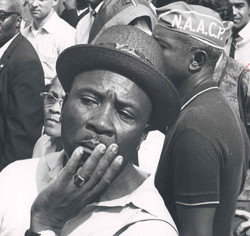
1910 The Crisis Magazine is Founded
This monthly magazine was published by the NAACP and edited by W.E.B. Dubois during its initial 24 years in publication.
1910 The "Fight of the Century" between Jack Johnson and James Jeffries
The first African American heavyweight champion of the world, Jack Johnson, defeated his white opponent, James Jeffries, causing a race riot.
1910 National Urban League Founded
The National Urban League was formed in New York City to improve urban conditions among blacks. It focused on assisting migrating African Americans, helping them find employment and housing.
1910-1930 The Great Migration
Large numbers of African Americans left the south to escape sharecropping, lynch mobs, and poverty, migrating north to cities such as Chicago, Detroit, New York, and Cleveland.
1913 Alien Land Law Enacted
Federal law prohibited ownership of real estate by aliens ineligible for citizenship. This applied to Asian aliens since they were ineligible for naturalization under U.S. immigration laws.
1914-1918 World War I
1920 19th Amendment is Ratified Giving Women the Right to Vote
1920 Negro National League Founded
The Negro National League was the first of baseball's Negro leagues.
1923 Charles Clinton Spaulding Becomes President of North Carolina Mutual Life Insurance Company
By the time of his death in 1952, Spaulding had built the North Carolina Mutual Life Insurance Company into the country's largest black-owned business.
1925 Ku Klux Klan Parade Held in Washington, D.C.
50,000 members parade unmasked through the streets of Washington, D.C. as national membership in the KKK tops 4 million.
1927 Harlem Globetrotters Established
1929 Great Depression Begins - Stock Market Crash
1931 Walter White Leads NAACP
Walter White became the leader of the NAACP with the ultimate goal of stamping out lynchings. There were more than 60 lynchings per year during the first few decades of the 20th century in the United States. By the time of White's death in 1955, lynchings had become infrequent.
1932-1972 The Tuskegee Syphilis Experiment
The U.S. Public Health Service (PHS) conducted a clinical study around Tuskegee, Alabama, one of Alabama's poorest counties, where 399 poor, mostly illiterate black male sharecroppers were intentionally infected with syphilis.
1936 Jesse Owens Wins Four Gold Medals at Olympics
Owens' victory rebuked Adolf Hitler's desire to use the games as an exhibition of Aryan supremacy.
1937 Zora Neale Hurston Publishes Their Eyes Were Watching God
Hurston's second novel received both acclaim and criticism within the black community.
1939 Marian Anderson Sings at the Lincoln Memorial
The Daughters of the American Revolution barred Marian Anderson from singing at Constitution Hall. She sang, instead, at the Lincoln Memorial to a crowd numbering 75,000.
1939-1945 World War II
1941 U.S. Army Forms the Tuskegee Airmen, an African American Air Combat Unit
1941 A. Philip Randolph Calls for March on Washington
Threats by A. Philip Randolph, prominent Negro labor spokesman, to call for a march on Washington led president Franklin D. Roosevelt to issue an executive order forbidding racial discrimination in the war-related industry.
1942 Internment of Japanese Americans
President Franklin Roosevelt authorized the relocation of Japanese Americans on the Pacific west coast to internment camps.
1942 Congress of Racial Equality (CORE) Founded by James Farmer
1944 United Negro College Fund is Incorporated
1945 Ebony Magazine Founded by John H. Johnson
Ebony was published to appeal to middle-class African Americans and became an immediate success.
1945 Harry Truman, 33rd President
1947 Jackie Robinson Enters the Major Leagues
The first African American baseball player in the major leagues played his first major league game.
1947 Congress of Racial Equality (CORE) Tests the Supreme Court Ban on Segregation
CORE tested the Supreme Court's ban on segregation in interstate travel with their two-week long "Journey of Reconciliation." This movement marked the beginning of a series of similar campaigns, which were later named the "Freedom Rides."
1948 Integration of American Armed Forces
President Harry S. Truman ordered the integration of the American armed forces with executive order 9981, the first major action by the American government to desegregate one of its institutions.
1950 Gwendolyn Brooks Receives Pulitzer Prize for Poetry
Gwendolyn Brooks became the first African American writer to win the Pulitzer.
1950-1953 Korean War
1952 Ralph Ellison Publishes Invisible Man
Ralph Ellison received the National Book Award the following year for the book hailed as his masterpiece.
1953 Dwight Eisenhower, 34th President
1954 Supreme Court Enforces Desegregation
Public schools were formally desegregated by the U.S. Supreme Courts decision in Brown vs. Board of Education. As a result, local school boards had one year to prepare plans to desegregate. In hundreds of southern communities, citizens' councils formed to ensure continued segregation on the local level.
1955 Murder of Emmett Louis Till
A fourteen year old boy from Chicago was murdered by two white men because he broke an unwritten Jim Crow law, when he whistled at a white woman. The two white men were quickly acquitted by an all-white jury, sparking controversy, and mobilizing the Civil Rights movement.
1955 Rosa Parks Triggers a Mass Movement
Rosa Parks refused to give up her bus seat to a white passenger in Montgomery, Alabama. Martin Luther King, Jr. spearheaded the resulting Montgomery bus boycott.
1957 Little Rock Central High School Integregation
As part of the initiative to integrate schools, nine black students were sent to Little Rock Central High School, and were faced with severe animosity and violence in an effort to keep the nine students out of the school. The governor of Arkansas called upon the National Guard to prevent integration at the school. This required president Eisenhower to send federal and national guard troops to intervene.
1957 Southern Christian Leadership Conference Formed
Martin Luther King, Jr., and others founded the SCLC to assist and organize local groups pressing for full equality of African Americans.
1957-1975 Vietnam War
1960 Sit-in Movement Spreads Through the South
In February 1960, a new and dramatic phase of the black protest movement began in the South. A group of students in Greensboro, North Carolina staged a sit-in to demand service at segregated lunch counters and refused to leave when they were ignored. Sit-ins immediately spread throughout the southern states, and "marked the first time that Negroes in the South had asserted themselves in a mass movement to end discrimination."
1960 Student Nonviolent Coordinating Committee (SNCC) Created
Two months after the sit-ins in Greensboro, SNCC was formed at Shaw University in Raleigh to coordinate the use of nonviolence to respond to segregation and other forms of racism.
1961 John F. Kennedy, 35th President
1961 Freedom Riders Challenge Segregation
An integrated group of travelers began a bus trip through the South to declare their intention to defy segregated bus seating and terminal restrictions.
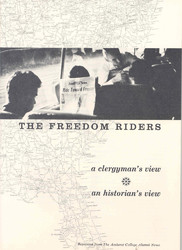
1962 University of Mississippi Admits James Meredith, its First African American Student
The U.S. Supreme Court ruled that the University of Mississippi must admit James Meredith, its first African American student.
1962 Cesar Chavez Begins the Struggle for Unionization of Migrant Farm Workers
Cesar Chavez founded the National Farm Workers Association, which later became the United Farm Workers of America.
1962 Cuban Missile Crisis
Confrontation between the U.S. and the Soviet Union, surrounding Soviet deployment of missiles in Cuba, brought the 2 nations close to a nuclear war.
1963 Birmingham, Alabama - Center of the Civil Rights Movement
Birmingham, Alabama was the scene of demonstrations led by Martin Luther King, Jr., which resulted in hundreds of arrests and brutal repression by local police who attacked young demonstrators with police dogs and fire hoses.King was imprisoned and a group of eight influential Birmingham clergy, including two Episcopal bishops, issued a statement deploring the demonstrations and condemning King's actions as "unwise and untimely." In response, King wrote his famous "Letter from Birmingham Jail," in which he not only answered his critics but voiced great disappointment with the "white church and its leadership."
1963 Medgar Evers Assassinated
Evers, the Mississippi field secretary for the NAACP, was shot and killed in front of his home.
1963 16th Street Baptist Church Bombings
A bomb set by the Ku Klux Klan at a Baptist church in Birmingham exploded, killing four girls attending Sunday school. In 1977, one bomber was convicted of the crime.
1963 President Kennedy Assassinated
In December, U.S. President John F. Kennedy was assassinated while riding in a motorcade in Dallas, Texas.
1963 Lyndon B. Johnson, 36th President
1964 Freedom Summer
In an attempt to end the political disenfranchisement of African American in the deep South, CORE, NAACP, and SNCC sponsored a voter registration campaign during the summer of 1964. Volunteers concentrated their efforts in Mississippi.
1964 Mississippi Civil Rights Workers are Murdered
Andrew Goodman, Michael Schwerner, and James Chaney were volunteering during Freedom Summer in Philadelphia, Mississippi when they were abducted and killed. In 1967, Edgar Killen was among 19 people who faced federal charges for the crime. Killen's case ended in a mistrial while 7 others were convicted of conspiracy. The case was reopened in 2005 in which Killen was found guilty of manslaughter. He has appealed the verdict and is awaiting a hearing.
1964 Congress Passes Civil Rights Bill
On July 2, President Lyndon B. Johnson signed the civil rights legislation into law. The bill was supported by religious groups across the country. Episcopal laity and clergy lobbied for months in support of its passage. Presiding Bishop Arthur C. Lichtenberger commended the legislation.
1964 Martin Luther King, Jr., is Awarded the Nobel Peace Prize
1965 Malcolm X Assassinated
Muslim leader Malcolm X was assassinated in Harlem by three members of the Nation of Islam - Talmadge Hayer, Norman 3X Butler, and Thomas 15X Johnson.
1965 King Leads March to Montgomery
Martin Luther King, Jr. issued a nationwide call for "men of good will" to come to Selma, to join in the campaign and to focus national attention on their effort. Thousands of clergy, religious, and lay people responded to his call. Several bishops of the Episcopal Church spent time in Selma. Thousands joined the march as it drew closer to Montgomery. On March 25, a crowd of tens of thousands rallied in front of the state capitol, where Martin Luther King, Jr. addressed them. Hundreds of Episcopal clergy took part in the last stages of the march. The demonstrations, which reached their peak in the March to Montgomery, were the last major actions of the Civil Rights Movement in the United States.
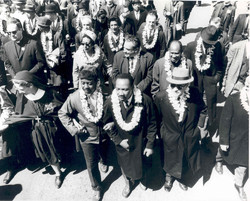
1965 Voting Rights Act Passed
The federal government passed the Voting Rights Act so that southern states would not be able to enforce discriminatory practices such as literacy tests in order to prevent African Americans from voting.
1965 34 Killed in Watts Riots
In August, the worst rioting in the United States swept the Watts area of Los Angeles, leaving 34 dead.
1965 Hurricane Betsy Hits
Hurricane Betsy caused enormous damage in the Bahamas, Florida, and Louisiana during the 1965 Atlantic hurricane season. Significant flooding occurred in New Orleans.
1965 The Vietnam War
President Johnson committed massive American military aid to the South Vietnamese government. Most civil rights leaders supported him. Martin Luther King spoke against the war, while most white Americans supported the president. The disapproval conveyed by King and the more militant groups increased backlash sentiment.
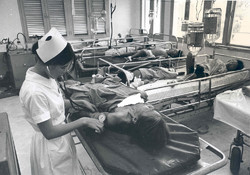
1966 Black Power Movement Gains Momentum
Heated dissension began over goals, tactics, and the participation of whites in the coalition of major civil rights groups. The Black Panthers, a militant organization, was founded in Oakland by Bobby Seale and Huey Newton. Martin Luther King, Jr., Stokely Carmichael, and others attempted to preserve a united facade. During a rally in Greenwood, Mississippi, Carmichael introduced the slogan "Black Power" as their goal. It replaced the goal of integration with a new objective - self-determination - and became the frame of reference for the Freedom Movement. In retrospect, ESCRU President John Morris viewed the Black Power movement as "tragic historically, practically unattainable, morally and theologically unacceptable, but probably inevitable and possibly, necessary."
1967 Che Guevara Murdered
Communist revolutionary Ernesto "Che" Guevara was murdered in the jungles of Bolivia at the age of 39.
1967 Muhammad Ali Refuses Induction into Armed Services
Muhammad Ali was stripped of his title and barred from the boxing ring.
1967 Thurgood Marshall Becomes the First African American Supreme Court Justice
1967 Loving vs. Virginia
The Supreme Court declared Virginia's anti-miscegenation statute unconstitutional, ending all race-based legal restriction on marriage in the United States.
1968 Martin Luther King, Jr. Assassinated
Martin Luther King, Jr. was assassinated in Memphis, Tennessee. Riots followed in at least 125 cities across the grieving nation.
1968 Shirley Chisolm Becomes the First Black Woman Elected to the U.S. Congress
1969 Richard Nixon, 37th President
1969 Man on the Moon
U.S. astronaut Neil Armstrong became the first person to walk on the moon.
1970 Kent State Shootings
Students protesting against the American invasion of Cambodia were shot by the Ohio National Guard. Four students died and nine others were wounded. The event triggered student strikes across the country and forced many universities to close temporarily. Many years later, some viewed it as the beginning of the end of the Nixon administration.
1970 La Raza Unida Party Formed
La Raza Unida Party was formed to empower and unite Mexican-Americans.
1971 Cointelpro Exposed
Cointelpro was an acronym for "counter intelligence program" and was designed by the FBI to neutralize political dissidents. More than 200 operations were conducted between 1956-1971 before the programs were officially discontinued in April of 1971 after public exposure and outcry. Targets included Martin Luther King's Southern Christian Leadership Conference, the Ku Klux Klan, the Black Panthers, and the Communist Party.
1972 Equal Employment Opportunity Act
The U.S. government created the Equal Employment Opportunity Commission, which possessed investigatory powers and the Civil Services Commission, which ensured there were no discriminatory practices in federal government employment.
1972 Watergate Scandal Breaks
U.S. political scandal led to the eventual resignation of President Nixon in 1974.
1974 Gerald Ford, 38th President
1975 Arthur Ashe Wins Singles Title at Wimbledon
Arthur Ashe became the first African American to win the Wimbledon title.
1977 Alex Haley's Roots: the Saga of an American Family Debuts
Roots became one of the most popular shows in the history of American television.
1977 Jimmy Carter, 39th President
1979 U.S. Hostage Crisis in Iran
66 hostages, diplomats, and citizens were held by the new Iranian regime for 444 days. Many saw the hostage crisis as the event that kept President Carter from winning re-election to the office of the president.
1981 Ronald Reagan, 40th President
1983 Alice Walker Receives Pulitzer Prize for The Color Purple
1986 Space Shuttle Challenger Explodes
The space shuttle exploded 73 seconds after launch.
1986 Chernobyl Disaster
The world's worst nuclear power accident occurred in the former USSR (Ukraine). More than 200,000 people were evacuated from the city and surrounding areas and had to be resettled when the nuclear power plant exploded creating clouds of radioactive particles.
1988 Civil Liberties Act Passed
This United States federal law granted reparations to Japanese-American survivors of the World War II internment camps. Each survivor was compensated approximately $20,000 and received a presidential apology.
1989 Tiananmen Square Demonstration
A large student demonstration for democratic reform, denouncing corruption and economic instability, was suppressed by the Chinese government. Estimates of civilian deaths varied widely from 400 to 7,000.
1989 Fall of Berlin Wall
The fall of the wall separating East and West Berlin and the subsequent reunification of Germany symbolized the end of the Cold War.
1989 George H. W. Bush, 41st President
1990 End of Apartheid in South Africa
The end of apartheid, institutionalized racism, was enforced by the white minority government of South Africa.
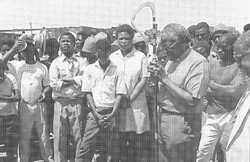
1990-1991 The Persian Gulf War
1992 Los Angeles Race Riots
Los Angeles police officers were acquitted of using excessive force in the beating of Rodney King, a case that was largely publicized due to the subsequent television broadcast of the beating on videotape. Riots broke out in Los Angeles in response to the verdict. Fifty to sixty people were killed, and 1,100 buildings were destroyed by fires.
1993 Toni Morrison Receives the Nobel Prize for Literature
Toni Morrison also won the Pulitzer Prize for fiction for her novel, Beloved.
1993 Bill Clinton, 42nd President
1993 Joycelyn Elders Becomes First African American Woman U.S. Surgeon General
1995 Million Man March in Washington, D.C. Led by Louis Farrakan
2001 George W. Bush, 43rd President
2001 The September 11th World Trade Center Attack
Islamic fundamentalist terrorists hijacked planes targeting the World Trade Center in New York City and the Pentagon, killing approximately 3,000.
2001 U.S.A. Patriot Act and War on Terrorism
The U.S. government granted expanded law enforcement abilities for the F.B.I. to search for potential terrorists including those within the United States, in response to the terrorist attacks of September 11.
2003 U.S.- Led Forces Invade and Occupy Iraq and Capture Saddam Hussein
2004 Barack Obama is Elected to the U.S. Senate
Barack Obama became the third African American to serve on the U.S. Senate since Reconstruction.
2005 Hurricane Katrina Hits the Atlantic Coast
Catastrophic damage was caused along the coastlines of Alabama, Louisiana, and Mississippi. Hurricane Katrina was the costliest and one of the deadliest hurricanes to ever hit the United States. The flooding of New Orleans disproportionately affected the black community there.
2006 Coretta Scott King Dies
Widow of Martin Luther King, Jr. died on January 30.
2008 Barack Obama, 44th President
Barack Obama, former Senator from Illinois, becomes the first African American to hold the office of President of the United States.
2012 Trayvon Martin is Fatally Shot
Trayvon Martin, a 17-year-old African-American boy, was fatally shot by George Zimmerman, a neighborhood watch volunteer, while returning home at night from a convenience store. Zimmerman was acquitted of all charges due to Florida’s "Stand Your Ground" laws. The killing and subsequent acquittal sparked outrage among many, and focused the national discourse on racial profiling and inequities in the application of the law to people of color.
2013 Black Lives Matter is Formed
In response to the acquittal of George Zimmerman, an online campaign was launched to address the perception that black lives were of less value in America than white ones. Initially participants showed support by using the hashtag "#BlackLivesMatter," but eventually the group began planning in-person demonstrations and protests, and has since become one of the most prominent voices in the current conversation surrounding race.
2014 Death of Michael Brown
Michael Brown, an 18 year old African-American man, is fatally shot by a white police officer in Ferguson, MO, sparking violent protests and rioting in the predominately-black city. Brown’s shooting, and a number of well-publicized similar incidents, brought the issue of disproportionate police violence against African Americans to the attention of the media and the forefront of national discourse.
2016 Donald J. Trump, 45th President.

